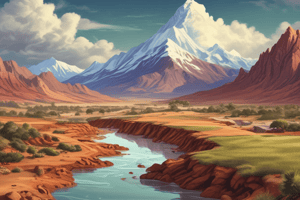Podcast
Questions and Answers
What is the primary focus of physical geology?
What is the primary focus of physical geology?
- Analysis of mineral properties and classifications
- Study of Earth's history over time
- Examination of Earth's materials and processes (correct)
- Research of fossilized organisms
Which type of rock is formed from the cooling of magma?
Which type of rock is formed from the cooling of magma?
- Metamorphic
- Igneous (correct)
- Conglomerate
- Sedimentary
What does paleontology primarily study?
What does paleontology primarily study?
- Tectonic plate movements
- Fossilized organisms and their geological relationships (correct)
- Composition and structure of rocks
- Mineral properties and classifications
In geological time, what are the largest divisions called?
In geological time, what are the largest divisions called?
Which geological process involves the movement of weathered materials?
Which geological process involves the movement of weathered materials?
Which branch of geology is essential for understanding resource management?
Which branch of geology is essential for understanding resource management?
What primarily causes volcanic activity?
What primarily causes volcanic activity?
What is the difference between weathering and erosion?
What is the difference between weathering and erosion?
Flashcards are hidden until you start studying
Study Notes
Geology Overview
- Definition: Geology is the scientific study of the Earth, including its materials, processes, history, and structure.
Branches of Geology
-
Physical Geology
- Focuses on the Earth's materials and the processes that shape it.
- Studies rocks, minerals, earthquakes, and volcanism.
-
Historical Geology
- Investigates the Earth's history and the processes that have changed it over time.
- Examines sedimentary layers, fossils, and geological timelines.
-
Mineralogy
- Studies minerals, their properties, classification, and distribution.
- Essential for understanding resource management and mineral extraction.
-
Petrology
- Examines the origin, composition, and structure of rocks.
- Divided into igneous, sedimentary, and metamorphic rock studies.
-
Paleontology
- Focuses on fossilized organisms and their relationships to geological processes.
- Aids in the understanding of past environments and evolutionary biology.
-
Geophysics
- Employs physical methods to study the Earth's shape, gravity field, and geodynamics.
- Uses seismic waves to study the Earth's interior.
Earth Materials
-
Rocks
- Igneous: Formed from cooled magma (e.g., basalt, granite).
- Sedimentary: Formed by accumulation of sediments (e.g., limestone, sandstone).
- Metamorphic: Formed from the alteration of existing rocks under heat and pressure (e.g., marble, schist).
-
Minerals
- Naturally occurring, inorganic solids with a specific chemical composition and crystalline structure.
- Common minerals include quartz, feldspar, and mica.
Geological Processes
-
Tectonic Processes
- Plate tectonics cause earthquakes, volcanic activity, and mountain building.
- The Earth’s lithosphere is divided into tectonic plates.
-
Weathering and Erosion
- Weathering: Breakdown of rocks due to atmospheric conditions.
- Erosion: Movement of weathered materials by wind, water, or ice.
-
Sedimentation
- The process by which sediments are deposited in layers, usually in bodies of water.
Geological Time Scale
- Divides Earth's history into different time periods ranging from eons to epochs.
- Key divisions:
- Eons: Hadean, Archean, Proterozoic, Phanerozoic.
- Eras: Paleozoic, Mesozoic, Cenozoic.
Common Geological Hazards
- Earthquakes: Sudden ground movements caused by tectonic activities.
- Volcanoes: Eruptions resulting from magma movement.
- Landslides: Gravity-driven movement of rock and soil.
Importance of Geology
- Helps in understanding natural resources (minerals, fossils fuels).
- Essential for environmental management and hazard assessment.
- Informs infrastructure development and land-use planning.
Geology
- The scientific study of the Earth, its materials, history, processes, and structure
Branches of Geology
- Physical Geology studies the Earth's materials and the processes that shape it, including rocks, minerals, earthquakes, and volcanism
- Historical Geology investigates the Earth's history by examining sedimentary layers, fossils, and geological timelines
- Mineralogy studies the properties, classification, and distribution of minerals, which is essential for understanding resource management and mineral extraction
- Petrology examines the origin, composition, and structure of rocks, which is divided into igneous, sedimentary, and metamorphic rock studies
- Paleontology studies fossilized organisms and their relationship to geological processes, which aids in the understanding of past environments and evolutionary biology
- Geophysics uses physical methods to study the Earth's shape, gravity field, and geodynamics, including using seismic waves to study the Earth's interior
Earth Materials
- Rocks are classified as igneous, sedimentary, or metamorphic based on their formation
- Igneous rocks, like basalt and granite, are formed from cooled magma
- Sedimentary rocks, like limestone and sandstone, are formed by the accumulation of sediments
- Metamorphic rocks, like marble and schist, are formed by the alteration of existing rocks under heat and pressure
- Minerals are naturally occurring, inorganic solids with a specific chemical composition and crystalline structure
- Common minerals include quartz, feldspar, and mica
Geological Processes
- Tectonic Processes are caused by the Earth's lithosphere being divided into tectonic plates, which cause earthquakes, volcanic activity, and mountain building
- Weathering is the breakdown of rocks due to atmospheric conditions
- Erosion is the movement of weathered materials by wind, water, or ice
- Sedimentation is the process by which sediments are deposited in layers, usually in bodies of water
Geological Time Scale
- Divides Earth’s history into different time periods ranging from eons to epochs
- Eons are the largest divisions of geological time
- Hadean, Archean, Proterozoic, and Phanerozoic
- Eras are subdivisions of eons
- Paleozoic, Mesozoic, and Cenozoic
- Eons are the largest divisions of geological time
Common Geological Hazards
- Earthquakes are sudden ground movements caused by tectonic activities
- Volcanoes are eruptions resulting from magma movement
- Landslides are gravity-driven movements of rock and soil
Importance of Geology
- Geology helps understand natural resources like minerals and fossil fuels
- It is essential for environmental management and hazard assessment
- It informs infrastructure development and land-use planning
Studying That Suits You
Use AI to generate personalized quizzes and flashcards to suit your learning preferences.




